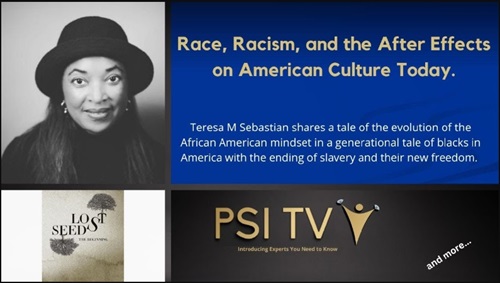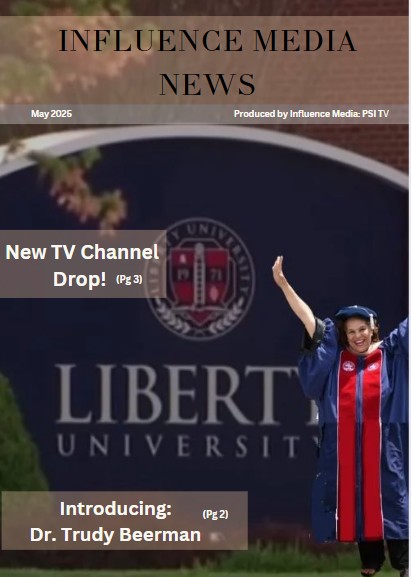Overview
Teresa Sebastian was a guest on PSI TV. Discover the profound impact of family history on generations through Teresa Sebastian’s award-winning historical fiction, “Lost Seeds, The Beginning.” Uncover how this captivating saga, set in the early 1900s, delves into the enduring legacy of slavery and the contrasting lives of two brothers, Dub and Tim, shaped by their shared yet divergent family experiences.
Get the book here https://amzn.to/3BAF3ax Teresa Sebastian, a distinguished business executive, lawyer, and author, shares her in-depth research journey fueled by poignant family stories and historical records. Through her novel, she sheds light on the pervasive influence of America’s black past on today’s experiences, exploring themes of identity, resilience, and the quest for equality.
Let’s Dive in and Learn About This Book.
The legacy of our ancestors often influences us more deeply than we realize. “Train up a child in the way he should go, and even when he is old, he will not depart from it,” as Proverbs 22:6 states. This powerful message speaks to the lasting impact of family, culture, and historical experiences on shaping who we become. To what extent does our family history affect our present and future?
This theme resonates profoundly in Lost Seeds, The Beginning, a gripping novel by Teresa Sebastian. As a lawyer, business executive, and author, Sebastian brings a unique perspective to her storytelling, seeking to explore how family experiences and history shape individuals across generations. Her novel, a historical fiction set in the early 1900s, captures the weight of generational trauma in the context of slavery’s aftermath. Through the saga of one family, Sebastian exposes the struggles, resilience, and complex identities formed under the influence of past traumas and challenges.
The Roots of Lost Seeds: A Story Built on Family and Historical Research
Sebastian’s inspiration for Lost Seeds emerged from the family stories shared by her grandparents, parents, aunts, and uncles. To accurately depict the era, she meticulously researched historical slavery records, newspaper articles, and photos, immersing herself in the lives, dress, and struggles of that time. Her journey included studying the coal mining industry and the living conditions surrounding it—one of many hardships endured by Black Americans in that era.
Sebastian’s dedication to historical accuracy and authenticity gives her work a unique depth. Her storytelling captures the essence of the period, from the attire of postal workers to the social divides between the North and South. This strong sense of place and time grounds Lost Seeds in historical truth, which brings the characters’ struggles vividly to life.
Coping with Hardship: The Lingering Scars of Slavery
The characters in Lost Seeds reveal the pain of generational trauma. Sebastian’s portrayal of alcoholism as a coping mechanism speaks to the desperation that Black Americans faced as a result of the influence of slavery. The experiences of characters like Tuttle and his wife Betsy—marred by abuse and racial violence—highlight the toll of a society built on oppression. Their children, Dub and Tim, inherit these scars in different ways, illustrating how individuals from the same family can experience and respond to trauma uniquely.
Sebastian’s writing process, she shares, was marked by a deep sense of sadness rather than catharsis. She reflects on how the suffering endured by her ancestors ultimately granted her the freedoms she has today, though it came at a painful cost. Her book, she hopes, will inspire a change in human behavior—a shift away from the inherent need for superiority that often fuels such cruelty.
Family Influence on Identity and Life Path
Dub and Tim, two brothers growing up in the same household, represent two vastly different outcomes shaped by their shared yet individualized experiences. Sebastian examines how environmental factors and family values mold children’s personalities and future choices. In her own life, she credits the discipline, spirituality, and confidence instilled by her parents as the foundation for her success. Her novel portrays the reverse of this nurturing environment, showing how a lack of love, stability, and educational support can negatively impact children’s futures.
This contrast between Sebastian’s nurturing upbringing and the struggles faced by her characters highlights the ongoing effects of family environment on personal development—a theme that threads through the entire Lost Seeds series.
A Perspective Rooted in the Black Experience
As a Black author, Sebastian brings a unique perspective to historical narratives, often dominated by non-Black voices. Lost Seeds offers readers an authentic viewpoint, exploring complex identity struggles that are rarely addressed in traditional history books. Sebastian’s personal understanding of identity, shared by those who have felt torn between different racial or cultural groups, enriches her storytelling. The journey of Tim, in particular, reflects this ongoing struggle as he grapples with his mixed-race heritage and societal pressures to choose sides.
Sebastian’s series doesn’t shy away from difficult topics like racial identity and societal division. As she notes, multiracial families often face pressure to “choose” a cultural identity, a tension that continues to divide and affect people even today.
A Legacy That Lives On
The story doesn’t end with Lost Seeds, The Beginning. Sebastian continues the family’s journey through the civil rights movement of the 1960s in Lost Seeds: The Legacy, the second book in the series. This next installment dives deeper into the impact of America’s Black history on modern Black experiences. Each generation in her saga faces the challenges of their time, responding in different ways that reflect both the burdens and progress of the past.
Sebastian’s hope for humanity is clear: to eventually transcend the cycles of dominance and oppression that have marred history. Although generational healing may take decades, she believes it is possible for the wounds left by slavery to gradually fade. She dreams of a world where everyone is treated equally, a vision she holds dearly.
For those interested in exploring the impact of slavery’s grip on modern life, Lost Seeds, The Beginning is available on Amazon and through your favorite bookstores. Learn more about Teresa Sebastian and her work at teresamoseleysebastian.com. Sebastian’s work serves as a powerful reminder of our shared history, urging readers to recognize and honor the legacies that shape us all.
Back to HOME

